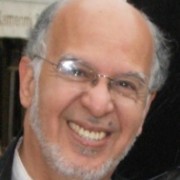I suppose that my interest in cultural psychiatry evolved from my childhood experience, growing up in Oran, Algeria. I was a member of a prejudiced-against minority group, even though I didn’t look, talk or behave in any way differently from the ‘French republican’ majority.
It was not clear to me, especially as a child, that I had to absorb at a young age the paradox of being a French citizen, as explained by my French teachers, and simultaneously having to understand the terrible repression against people of my Arab ethnic group who were carrying on the fight against French colonialism in Algeria, Morocco and Tunisia during my youth. I had to face the paradoxical fact that while I was good at school and was therefore presented as a successful example of the world-wide influence of the French educational system and French culture, I also was making a self-identification with the heroes of the Algerian independence movement who were fighting against France.
My father would try to help my siblings and I comprehend this apparent paradox of allegiances by explaining that we Algerians had nothing against French civilization, but we would never accept it under pressure and intimidation. It took me years of both humiliation and gratification to resolve this dilemma of identifications.
Eventually, I was able to defend both the poetry of Victor Hugo and the extraordinary stories of the golden age of Islam; both transmitted by my father, who I came to realize had decided to leave to me and to each of my siblings, the opportunity to evolve our own self-image as being both Arab Algerians and French.
My first real cultural shock was when I discovered in 1962, when Algeria became an independent country, separate from France, that all my college friends were gone; forced by the intense turmoil of those years leading to independence, to identify themselves definitively as French citizens and return to mainland France, ‘the metropole’, despite their families having lived for several generations as French Algerians. That is when I suddenly realized that I too would one day have to make a similar choice of having to identify myself as either Algerian or French; and could no longer be viewed by others, or view myself as what would now be called a ‘bi-cultural’ person. I was 14 years old when Algeria declared its independence from France.
A few years later, in the early 1970s, I became a student in the Faculty of Medecine of Oran University, where I participated actively in the organization of campus life. I worked hard to prepare for my medical career, because I had a strange feeling that I would specialize in cardiology, and that I would do so in France.
Another event had a major impact on my life, and is possibly the main reason I have become so interested in cultural psychiatry. While preparing to move to France after I had completed my medical degree in Oran, I was ordered to start my military service, and to do so in the Algerian Sahara; to work with the Bedouin population of that region. I was responsible for running a regional hospital operating under the very difficult socio-political conditions that prevailed at that time, during my two-year assignment.
I soon discovered that I had to take on responsibilities and make decisions I had not been prepared for, and I also had to cope with different conceptions of health and illness among people in the same country I grew up in and who presumably shared the same cultural background and values I grew up with. I realized every day how large the conceptual gap between me and my Bedouin patients was, when I had to explain to them the causes of infectious diseases, as well as psychiatric problems. In order to try to convince them to accept modern medicine’s treatment methods, I had to learn how to negotiate an acceptable treatment plan; integrating my scientific knowledge and skills with traditional beliefs in illness causation and treatment regimens. I learned how to integrate the biomedical value system I learned in medical school with traditional Bedouin magical beliefs, without losing my mind, or my status as a doctor trying to do my best for the sake of my patients’ well-being.
I am confident that I did help a lot in terms of treatment of illnesses that would otherwise have gone undiagnosed and untreated. At the same time, I am equally sure that I have learned more from my Bedouin patients and the Bedouin community I encountered during those two years of my military service, than I could have learned anywhere else, about death and about courage in the face of loss, misfortune and grief. I used to say that I became a real doctor through that experience.
Strangely enough, my decision to migrate to France and to establish my career there became stronger and stronger. My first shock after I moved to France, in 1976, was the realization that since Algeria had become an independent country, my education in the French system, including my medical degree, were no longer considered equivalent and equal in validity to degrees from French educational institutions.
I soon realized that I would have to scale many legal and cultural hurdles in order to be allowed to practice medicine in France. I had started specialty training in cardiology and had completed two years in cardiology, but I had also planned to switch to psychiatry.
I started my psychiatry training in Paris, at Necker Hospital, under the supervision of Prof Yves Pelicier. During my residency in psychiatry, I simultaneously undertook graduate studies and obtained a degree in anthropology at l’Ecole des Hautes Etudes en Sciences Sociales de Paris. My supervisor in anthropology was Prof François Raveau.
During those years, I had the chance to meet Prof George DeVos, an anthropologist from Univ California/Berkeley, who encouraged me to apply for a Fulbright Foundation grant to study ‘culture and personality’ at the Institute of Personality Assessment and Research (IPAR) at UC Berkeley.
That was a major learning and growth experience for me. Once again I had to cope with a very different educational system and different values than I had grown up with in French Algeria and in France. That experience, and my need to cope with the conceptual changes inherent in adapting to living and studying in California, changed my way of thinking, just as anthropology had opened my mind and my sphere of interest to ethics, philosophy and cybernetics.
Back in France after four months in California, I took an active part in introducing clinical medical anthropology in French cultural studies, which seemed to me at that time, to be very ethnocentrically biased.
I don’t know just which aspects of my life experience up to that time gave me this feeling, but I did understand that changing culturally engendered thought patterns would require a sustained effort over many years, and I decided to commit myself to that endeavor.
Before I started working with the refugee and immigrant population served by the Minkowska Center in Paris, I was a staff psychiatrist at ‘Migrations Santé’, where I met Richard Rechtman; another psychiatrist-anthropologist with interests similar to my own. Not surprisingly, we became close friends as well as colleagues. I became the director of Migrations Santé, now a national institution funded by the French government.
For many years now I have focused my professional life on the field of cultural psychiatry, sharing with respected colleagues and friends the burden of convincing researchers and government policymakers to take into account the differing cultural conceptions of mental health and mental illness when treating migrants and refugees, in order to avoid stigmatization and enhance community support.
In furtherance of these efforts, I have been an active member of the TP Section of the WPA, as well as a participant in SSPC meetings. I have helped organize several international congresses on the mental health of migrants and refugees.
During 2005 I was very pleased to have been elected as a member of the (executive) Committee of WPA-TPS, and to have been an active participant in the launching of the World Association of Cultural Psychiatry.
I have continued to maintain a private practice in Paris, where I specialize in treating patients in any of three languages; French, Arabic and English.

